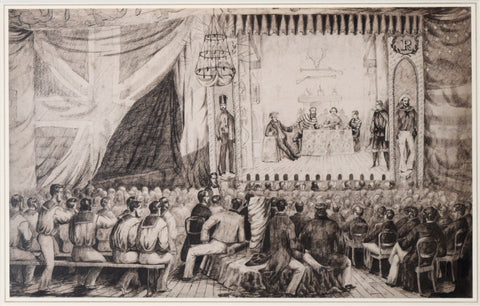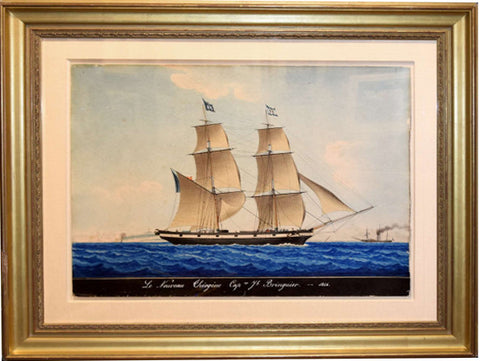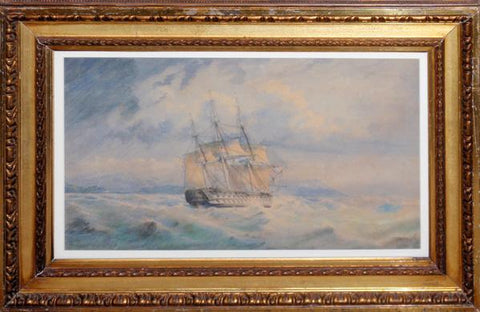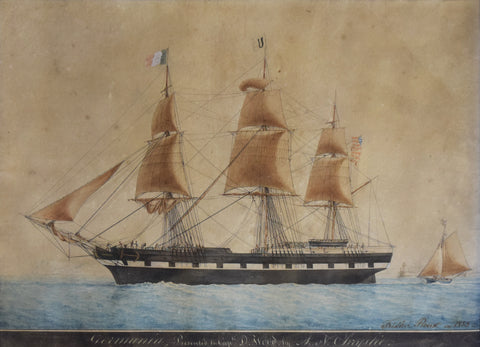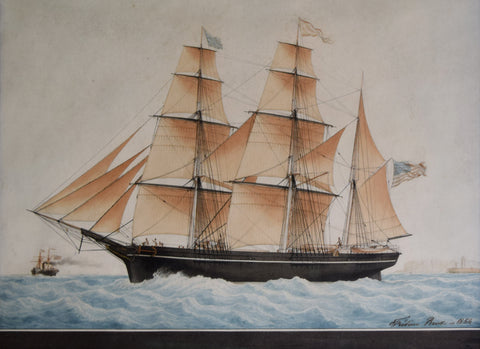![[NAPOLEONIC WARS - THE BATTLE OF ALGECIRAS BAY]. Fine Original Watercolour Drawing of the Battle of Algeciras, Combat d'Algeziras, 6th July, 1801 - 17 Messidor An 9. [ca 1801-1810].](http://aradergalleries.com/cdn/shop/products/NAPOLEONIC_WARS_-_THE_BATTLE_OF_ALGECIRAS_BAY_large.jpg?v=1478205431)
[NAPOLEONIC WARS - THE BATTLE OF ALGECIRAS BAY]. Fine Original Watercolour Drawing of the Battle of Algeciras, Combat d'Algeziras, 6th July, 1801 - 17 Messidor An 9. [ca 1801-1810].
Fine Original Watercolour Drawing of the Battle of Algeciras, Combat d'Algeziras,
6th July, 1801 - 17 Messidor An 9.
ca 1801-1810.
Sheet size: 16 5/8 x 23 3/4 inches
Single sheet, mounted on paste-board (image 14 4/8 x 22 4/8 inches). Original watercolour drawing, unsigned, showing the French/Spanish ships engaging with the British, surrounded by blue paper border and captioned "Combat d'Algeziras" with the date and the names of the ships, their commanders and the number of guns (surface with some minor insect damage, edges scuffed).
A near contemporary dramatic rendering of the first battle of Algeciras Bay on the 8th July 1801. This battle, a victory for the Franco-Spanish alliance in the Napoleonic wars, has been made famous in modern times by Patrick O'Brien in his novel "Master and Commander". Jack Aubrey views this battle from on board the French 74-gun ship 'Desaix', which had captured him earlier. The later and second battle, the "Gut of Gibraltar", he views from the Rock of Gibraltar.
The battle began on the 6th July 1801, when the French Admiral Linois brought four of his ships, the 'Formidable' commanded by himself and Captain Laindet Lalonde, the 'Indomptable' commanded by Captain Moncousu, the 'Desaix' by Captain Jean-Anne Christy de la Palliere, and the 'Murion' by Captain Martinencq, into Algeciras since the British had blockaded Cadiz. Algeciras was considered a safe haven for the French as it was protected by four Spanish forts.
From nearby Gibraltar the British observed the movements of the French and decided to move quickly to neutralise the obvious threat. On 8 July, a fleet under Admiral Sir James Saumarez sailed into the Bay of Gibraltar with intent. The British fleet consisted of six ships of the line: 'Caesar' under Saumarez's command with Captain Jahleel Brenton, 'Pompee' under Captain Charles Stirling, the 'Spencer' under Captain Henry d'Esterre Darby, the 'Venerable' under Captain Samuel Hood, 'Hannibal' under Captain Solomon Ferris, and the 'Audacious' under Captain Shuldham Peard. Saumarez's fleet attacked the French ships and Spanish forts, but a lack of wind and treacherous shoals were against them. The French squadron drove off the larger British force, and the French famously grounded their ships to avoid capture. The 'Hannibal' was lost after it ran aground and was obliged to surrender. The British lost 121 men killed and 240 wounded. The French lost 306 killed, including Captains Laindet Lalonde and Moncousu, and 280 wounded. Both sides retired to their respective sides of the bay, and over the next four days repaired their battle damage as best they could. In the second battle of Algeciras Bay, known as the 'Gut of Gibraltar', the French sailed out to sea with Saumerez in hot pursuit. However the French had now been joined by five Spanish ships from Cadiz, and this combined fleet was faster than the more damaged British. Nevertheless Saumarez gave the 74-gun 'Superb'- which was not present for the first part of the battle and was thus undamaged-the freedom to pursue and attack the allied fleet at will. After night had fallen, 'Superb' sailed between the Spanish ships 'San Hermenegildo' and 'Real Carlos'-both with 112 guns-and attacked them both. 'Superb' then proceeded up the Franco-Spanish line, but between the darkness and the smoke from the firing, the Spanish did not realise that the 'Superb' had sailed past, so the 'Real Carlos' and 'San Hermenegildo' inadvertently and furiously fired upon one another, resulting in the spectacular loss of both ships. 'Superb' then attacked and captured the French 'St. Antoine'. An ultimate victory for the British.
We Also Recommend

